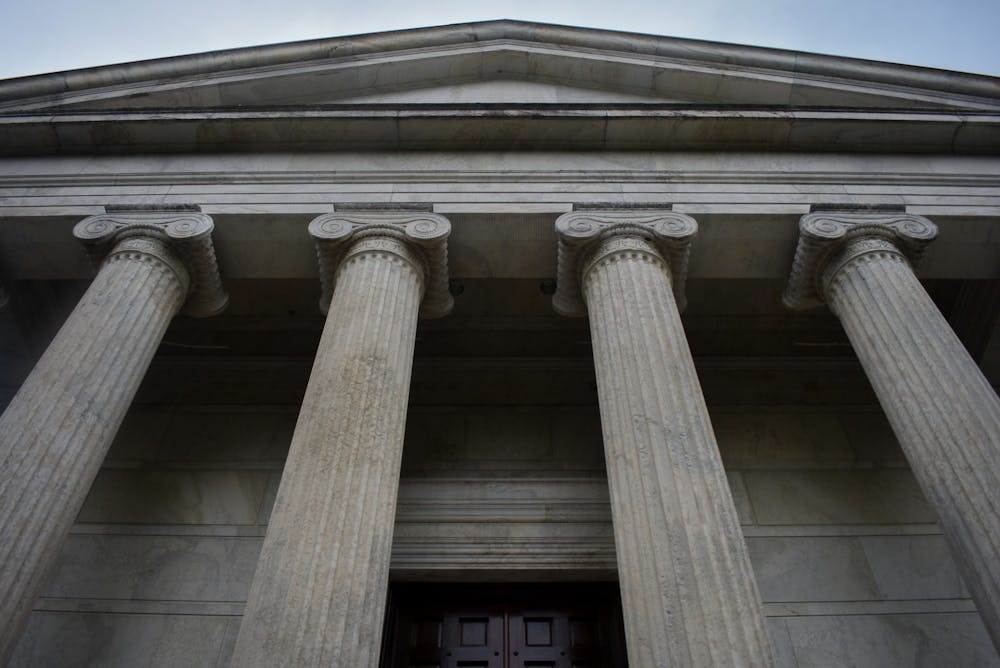George F. Will GS ’68 recently took to the pages of the Washington Post, where he is a regular columnist, to announce to the world that wokeness at Princeton is destroying free speech. Liberal censorship on college campuses has become an obsession on the political right, a pillar of their case that conservatives are under attack. It’s absurd — and reminiscent of the Red Scare — to declare a national slide into progressive tyranny due to “wokeness” at elite universities. But beyond that, the foundational argument that Princeton is “too woke” and therefore intolerant is a lie.
Will, and others who decry progressive “intolerance” at Princeton, often cite the school’s Foundation for Individual Rights in Education (FIRE) ranking: A dismal 169th out of 203 schools in 2022. Rankings, in general, are a weak tool for understanding schools’ individual characteristics — they hide nuance and context, encourage rigid thinking, and by rolling all metrics into one overall number, both reflect and obscure the biases of the list-maker. But since conservatives lean on Princeton’s FIRE ranking over and over and over and over and over again to prop up their argument, it’s worth analyzing, and in this case, debunking.
Since FIRE publishes its methodology, the reason why the ranking doesn’t square with the experience of being a student here is clear. On four of the seven components of the ranking, Princeton is very close to the University of Chicago, FIRE’s top-ranked school for free speech: UChicago’s “tolerance for speakers” is first, Princeton’s is sixth; UChicago’s “admin support” is first, Princeton’s is second; UChicago’s “openness” was 83rd, Princeton’s was better at 52nd; UChicago’s “comfort expressing ideas” was 60th, Princeton was close at 69th.
None of these justify Princeton’s #169 ranking compared to UChicago’s #1. The reason that Princeton is near the bottom of this ranking comes from the highly dubious scoring of the last three components of the ranking.
First, Princeton’s “speech code,” the “written policies governing student speech” is considered “red” to UChicago’s “green” — even though our University’s free speech code is the Chicago Principles. In fact, we were the second school to adopt the Chicago Principles, a move celebrated by FIRE itself. Clearly, we should have full points on this component of the ranking.
Second, we were penalized for “scholar sanctions.” Given the FIRE’s public comments on this incident, one such sanction was almost certainly the firing of Joshua Katz for sexual misconduct, which conservatives and mainstream media outlets alike have widely, but inaccurately in my view, portrayed as a reprisal for calling a student group, the Black Justice League, a “small local terrorist organization.” A brief conversation between President Eisgruber and FIRE should be sufficient to correct this misimpression and restore our score on this component.
Lastly, our “disruptive conduct” score of #192 (compared to UChicago’s #91) seems to be weighing us down. FIRE’s measure of “disruptive conduct” does not actually measure how much students are exercising their first amendment rights to civil disobedience, nor any other kind of real disruption. You have to go back five years, to the Black Justice League’s 2015 sit-in in Nassau Hall to see anything like civil disobedience at Princeton, and we would improve as a community if Princeton students engaged more actively in the issues of the day, including through civil disobedience. But our poor mark on the “disruptive conduct” score is because, in FIRE’s words, “24% of students say shouting down a speaker to prevent them from speaking on campus is never acceptable.”
Despite the conservative firestorm seemingly caused by this number, to my knowledge, nobody attending Princeton currently has ever “shouted down” a campus speaker. The closest we ever came to this was in 2012, when Occupy Princeton protestors attended a few big-bank recruitment events, asking questions and interrupting speakers for a few seconds to read coordinated statements — such as “we protest the campus culture that whitewashes the crooked dealings of Wall Street as a prestigious career path”— then leaving the event. They came, they protested, exercised their right to free speech, and then they left, allowing the students to continue listening to the speaker. Full points for free speech. On the way out of a Goldman Sachs event, they were booed by their peers.
Princeton’s low FIRE ranking is likely produced by misrepresented data. The FIRE rankings seem engineered to produce fodder for conservatives — UChicago on top, Princeton very low, and other elite schools like Yale, the University of Pennsylvania, and Columbia within the bottom six slots. This is not to say university campuses are perfect: Many Princeton students, including conservatives, could do a better job criticizing arguments instead of the people that make them and being more accepting of people who hold opinions they don’t agree with. But this legitimate argument that people need to be kinder to those who do not share their views is not the same as the assertion that conservatives are being systematically silenced.
Princeton’s “free speech problem” is imaginary. Conservatives have latched onto it because it sounds good and defensible — who doesn’t support free speech? — and because it allows them to cast themselves as the victims. But it’s a time-sucking distraction away from the important, real debates about ideas and problems that would truly improve our experience as a learning community. The fake free speech debate is also used as a tool to undermine legitimate progressive dissent or to condemn programs that seek to listen to the voices of oppressed groups. Free speech is alive and well at Princeton — don’t let right-wing rhetoric about its demise distract you from real problems.
Eleanor Clemans-Cope (she/her) is a first-year from Rockville, Md. intending to study economics. She spends her time making music with Princeton University Orchestra and good trouble with Divest Princeton. She can be reached on Twitter at @eleanorjcc or by email at eleanor.cc@princeton.edu.









